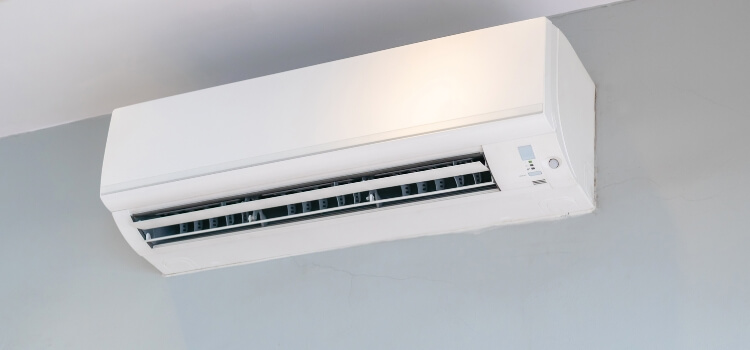As an Amazon Associate, I earn from qualifying purchases
An air conditioner runs on electricity. Electricity powers the fan, compressor, and other components.
A/C units don’t get their power from gas. They use power to cool and move the air around a room. Many homes and businesses have air units to cool things down when it’s hot and humid outside.
They provide a pleasant interior atmosphere by removing heat from the inside air and sending it outdoors. Understanding the power source of an air conditioner is essential for maintenance and troubleshooting. Whether it’s a window unit or a central air system, the electricity it consumes is what enables it to cool indoor spaces effectively.

Introduction To Air Conditioner Energy Sources
Air conditioners primarily use electricity to operate, with the refrigerant gas inside facilitating the cooling process. The electric power is essential for running the compressor, fan, and other components, while the gas absorbs and releases heat to regulate temperature efficiently.
Air conditioners are necessary to keep the home cool and pleasant during hot weather. However, many people are unsure about the energy source of air conditioners. Is air conditioner gas or electric? This article will address common misconceptions about AC power and explain why the distinction matters.
Common Misconceptions About Ac Power
One common misconception is that air conditioners run on gas. While some air conditioners use gas-powered engines, they are not the norm for residential use. Most air conditioners rely on electricity to power the system. Another misconception is that air conditioners consume a lot of energy, but this is not always the case. Energy-efficient models are available that use less power to cool your home.
Why The Distinction Matters
Understanding the energy source of air conditioners is important for several reasons. First, it can affect your utility bills. If you have an older, less energy-efficient air conditioner, your electricity bill may be higher than necessary. Second, it can impact the environment. Using less energy to cool your home can help reduce your carbon footprint. Lastly, knowing how air conditioners get their power can help you make a smart choice when you buy a new one.
To sum up, air units mostly use electricity instead of gas. Knowing where air units get their power can help you make smart choices about how to cool your home. If you choose an energy-efficient model, you can save money on your bills and help the world at the same time.
Types Of Air Conditioners
When it comes to cooling your space, there are various types of air conditioners to choose from. Let’s explore some popular options:
Central Ac Systems
Central AC systems are efficient solutions for cooling entire homes. They consist of a large compressor unit that cools and dehumidifies air.
Portable And Window Units
Portable and window units are versatile and easy to install. They are ideal for cooling individual rooms or small spaces.
Hybrid And Geothermal Options
Hybrid air conditioners combine electric power with a backup gas furnace for efficient heating and cooling. Geothermal systems use the earth’s natural heat for cooling.
Electric Air Conditioners
Electric air conditioners are a popular choice for cooling homes and businesses. These units operate using electricity to cool the air and provide relief from hot weather. Let’s explore how electric AC units work and their energy efficiency.
How Electric AC units Operate
Electricity is what powers the compressor in an electric air conditioner. The compressor moves the coolant around the system. The refrigerant takes in heat from the air inside and sends it to the outdoor unit, where it is let out. Because of this, the air inside gets cooler, making the space more comfy.
Energy Efficiency Of Electric Acs
Electric air conditioners can vary in energy efficiency based on their SEER (Seasonal Energy Efficiency Ratio) rating. The higher the SEER rating, the more energy-efficient the unit is. Energy-efficient electric AC units can help reduce electricity bills and minimize environmental impact by consuming less power while providing effective cooling.

Gas-powered Air Conditioning
Gas-powered air conditioning systems are an alternative to traditional electric units, offering unique benefits and functionality. Understanding the characteristics and usage of these systems can provide valuable insight into the world of air conditioning.
Functionality Of Gas Ac Systems
Gas-powered air conditioning units utilize natural gas or propane as their primary energy source. These systems operate through a process that involves the compression and expansion of gas to remove heat from indoor air, resulting in a cooling effect. The gas-powered AC units use a heat exchanger and a compressor to achieve the cooling process.
Availability And Usage Of Gas Acs
Gas-powered air conditioning systems are less common compared to traditional electric units. They are often used in commercial and industrial settings requiring large cooling capacities. These systems are also popular in regions where natural gas or propane availability and cost-effectiveness make them a viable option for air conditioning.
Comparing Energy Consumption
Electric Vs. Gas: The Energy Showdown
The choice between electric and gas air conditioners can significantly impact energy consumption. Let’s examine the differences to understand their energy efficiency.
Cost Implications On Your Energy Bill
Understanding air conditioner energy use is essential for minimising energy expenses. Let’s compare electric and gas-powered units.
Environmental Impacts
Regarding environmental impacts, it’s essential to consider the carbon footprint and the use of renewable energy concerning air conditioning systems. Let’s delve into these aspects to understand the environmental implications of air conditioner gas and electric systems.
Carbon Footprint Comparison
The carbon footprint of air conditioning systems is an important factor to consider. Electric air conditioners typically have a lower carbon footprint than those using refrigerant gas. The production and disposal of refrigerant gases add considerably to greenhouse gas emissions and ozone depletion. On the other hand, electric air conditioners have a lower carbon footprint since they do not use hazardous refrigerants as much.
Renewable Energy Considerations
Using renewable energy sources is crucial in mitigating the environmental impact of air conditioning systems. For example, solar or wind power can be used to power air conditioners. This can help cut down on carbon pollution and our reliance on nonrenewable energy sources. By harnessing renewable energy, the environmental burden associated with electricity consumption for air conditioning can be minimized.
Maintenance And Longevity
Regular maintenance is crucial for both electric and gas air conditioning units to ensure optimal performance.
Factors affecting lifespan and replacement of air conditioners vary based on the type of unit and usage.
Future Trends In Air Conditioning
Although air conditioners primarily run on electricity, they use a refrigerant gas to cool the air. As ideas for the future of air conditioning keep changing, more and more attention is being paid to making refrigerants that are better for the earth and use less energy.

Innovations In Energy Efficiency
With the increasing worldwide demand for air conditioning, there is a corresponding need for energy-efficient cooling systems. Energy efficiency enhancement has emerged as a crucial concern for both air conditioning producers and engineers. Newer air conditioner models are engineered to minimise energy use while yet providing excellent cooling efficiency. With the use of inverter technology, air conditioners can now regulate the compressor speed, resulting in a significant reduction in energy consumption.
In addition, smart air conditioning systems have become increasingly popular in recent years. These systems are equipped with sensors that detect the temperature, humidity, and air quality of a room. Based on this information, the system adjusts the cooling output to ensure maximum efficiency.
Transition To Eco-friendly Refrigerants
Traditionally, air conditioning systems have used refrigerants that are harmful to the environment. These refrigerants contain chemicals that contribute to ozone depletion and global warming. However, in recent years, there has been a significant transition to more eco-friendly refrigerants.
Manufacturers are now using refrigerants such as R-32, R-290, and R-600a, which have lower global warming potential and are less harmful to the environment. With the implementation of these eco-friendly refrigerants, air conditioning systems are becoming more sustainable and environmentally friendly.
As the demand for air conditioning continues to increase, it is essential to focus on energy efficiency and eco-friendliness. Thanks to advances in technology, it is now possible to get the best cooling performance while using less energy. The transition to eco-friendly refrigerants is a step towards a more sustainable future. As consumers, It is important to pick air conditioners that use little energy and don’t hurt the environment.
Choosing The Right AC For Your Needs
When choosing the right AC for your needs, it’s important to consider whether it runs on gas or electricity. Electric AC units are more common and easier to install, while gas-powered ACs are more energy-efficient and cost-effective in the long run.
Before making a choice, think about your unique needs and funds.
Assessing Home Infrastructure
Check if your home’s electrical system supports the AC’s power requirements.
Climate And Ac System Efficacy
Consider the climate to determine the best AC type for optimal cooling efficiency.
Frequently Asked Questions
Check the outdoor unit – if it has a large metal cabinet, it’s likely a gas AC. Electric AC units are smaller and less noisy.
Air conditioners in houses typically use electricity, not gas, to cool the indoor air efficiently.
No, air conditioning does not use gas. It uses electricity to power the compressor and fans that cool and circulate the air. However, some older air conditioning systems use refrigerants that are harmful to the environment, and need to be replaced with more eco-friendly options.
Air conditioners are electric appliances that use refrigerant gas for cooling. Gas is not used for operation.
Conclusion
In summary, understanding the distinction between gas and electric air conditioner systems is crucial. Both have advantages and disadvantages. Gas ACs are efficient, while electric ones are more environmentally friendly. Consider your needs and environmental impact when choosing between the two.
Make an informed decision for your comfort and sustainability.
As an Amazon Associate, I earn from qualifying purchases
Leave a Reply